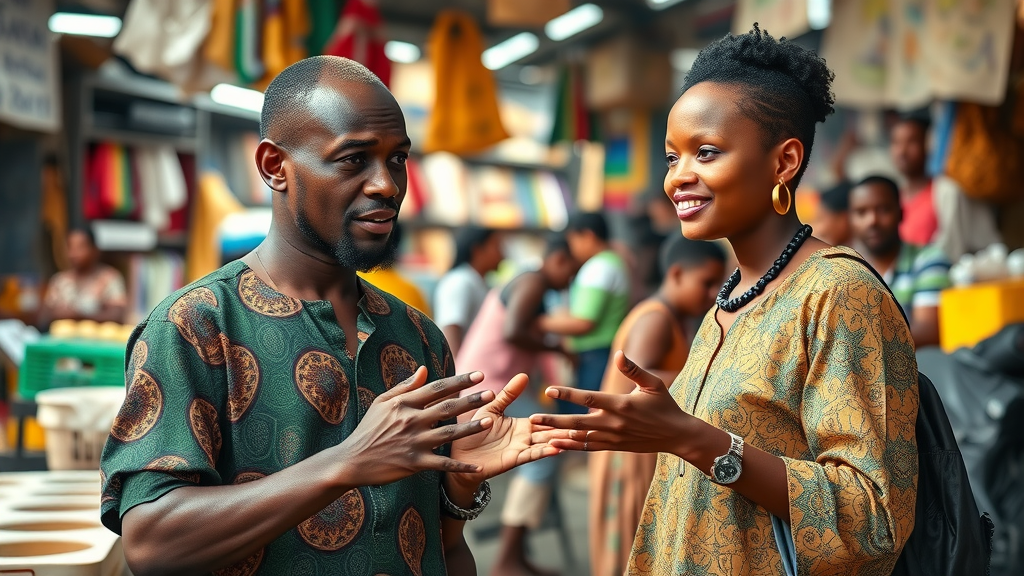Did you know that by 2025, more than half of all new businesses in Africa will be driven by digital marketing? This seismic shift means that the future belongs to those who embrace new digital marketing trends now, not those who wait. This guide will show you exactly how your small business can stay ahead, attract more customers, and grow faster by mastering 2025 digital marketing strategies tailored for the African market.Revealing the Digital Gap: Why 2025 Strategies for African Business Owners to Keep Up with Digital Marketing Trends Matter“By 2025, digital marketing will drive 50% of all new business in Africa – are you prepared to compete?”The rapidly advancing landscape of digital marketing trends demands that African business owners not only adapt but get ahead. As smartphones and internet connectivity become widespread, the digital gap will define those who thrive and those who fall behind. In Africa, the adoption of smart technologies, social media, and online platforms is happening at a revolutionary pace, making old playbooks obsolete. If your marketing strategies aren’t evolving, your competitors will outpace you quickly.Addressing this gap means understanding what it takes for small businesses to stay ahead of global digital shifts while leveraging unique local opportunities. Whether it’s adopting new marketing trends , harnessing engine optimization , or implementing digital marketing solutions tailored for African audiences, your ability to adapt in 2025 will be the key determinant of long-term business growth. Let’s dive into actionable strategies for the year ahead.Unlocking Success: 2025 Strategies for African Business Owners to Keep Up with Digital Marketing TrendsThe importance of digital marketing and marketing trends in Africa for 2025Proven 2025 digital marketing strategies for African small business growthHow social media, content marketing, and influencer marketing drive customer engagementMaximizing AI, video content, and generated content for modern digital marketingKey 2025 Digital Marketing Trends and Their Business Impact for African Business OwnersDigital Marketing TrendImpact on African Business2025 Opportunity LevelAI-powered PersonalizationImproves customer engagement and increases sales by targeting audiences with relevant offersHighShort-form Video ContentBoosts brand visibility, especially among younger consumers on social mediaVery HighInfluencer and Generated ContentDrives authenticity and local trust, expanding organic reachHighMobile-first Search Engine OptimizationEnhances discoverability and drives traffic from search engines and social media platformsMediumAutomated Marketing ToolsReduces costs and saves time for small businesses, improving campaign efficiencyHighAs we head towards 2025, it’s clear that digital marketing strategies are a must-have for any African business owner wanting to stay ahead. Embracing AI, harnessing the power of social media platforms, and creating culturally-driven content will not only help you build brand awareness but also forge a deeper connection with your target audience. From online chats powered by artificial intelligence to immersive video marketing and authentic influencer partnerships, every marketing trend in this table represents a unique chance to revolutionize your presence and drive business growth in Africa’s evolving market.Analyzing the Future: Digital Marketing and Marketing Trend Projections for African Business OwnersUnderstanding Digital Marketing Trends Shaping Africa in 2025Africa’s digital marketing environment is entering a golden era fueled by infrastructure investment, rising smartphone usage, and a tech-savvy, youthful population. In 2025, look for marketing trends such as hyper-localized ads, voice-based search, and chatbots redefining customer engagement—helping small businesses reach audiences once locked out of digital commerce.These emerging trends offer unique advantages, especially compared to older static campaigns. Expect to see digital marketing campaigns incorporating AI-driven content, seamless mobile interfaces, and a strong focus on real-time analytics. By recognizing and adapting to these advancements, African business owners can ensure their marketing strategies not only match global standards but set them, capturing diverse markets both locally and across borders.It’s not just about being on trend, but about building a digital foundation that supports rapid response to these evolving shifts. African entrepreneurs who invest in learning and applying these new technologies—like generative AI for creative campaigns or mobile-first SEO—will experience exponential returns on their marketing efforts.How Marketing Trend Analysis Influences Small Business StrategiesMarketing trend analysis is now an essential strategic tool for African small businesses. By analyzing what campaigns perform best on which platforms, owners can identify which content resonates most with their target audience. This data-driven approach helps optimize spending, reduce wasted effort, and maximize customer engagement both online and offline.A regular review of digital marketing trends also ensures your brand pivots quickly—with smarter allocation of resources to the platforms and tactics with the highest ROI. For example, when TikTok marketing exploded in Nigeria and South Africa, early movers captured viral attention simply by riding the wave of trending digital content marketing.By monitoring analytics, much like global digital leaders, African business owners can pinpoint shifts in buying behavior, track emerging competitors, and even forecast changes before they happen. This proactive mindset is critical for capturing opportunities in a fast-evolving market.Embracing Marketing Strategies Tailored to African MarketsThe most successful digital marketing strategies are unique to Africa’s diverse consumer preferences, languages, and digital habits. Businesses that weave local culture, humor, languages, and even traditional storytelling into their marketing efforts see better engagement and more loyalty than those using one-size-fits-all global content.Consider, for instance, using mobile-friendly platforms that target consumers in urban hubs and rural communities alike. Offer payment options—including mobile money platforms and e-wallets—that reflect what your audience uses. When you localize your messaging, you show respect and understanding for your audience’s needs.Don’t forget collaboration with local content creators, community groups, and grassroots influencers to enhance trust and authenticity—key drivers for brand growth across African markets. By putting these marketing strategies into action, your business becomes an integrated part of the communities you serve.Mastering Social Media in 2025: Winning Strategies for African Small BusinessesLeveraging Social Media for Customer Engagement and GrowthSocial media is Africa’s great business leveler. It empowers even the smallest brand to build a loyal online following, create buzz, and compete with global giants. By 2025, social media platforms will continue to lead the way for small businesses looking to grow quickly in African markets. Prioritize authentic interaction—respond to comments, address customer concerns, and showcase your business journey in real time to boost customer engagement.Targeted content, hashtags relevant to your audience, and live video sessions are just a few ways to grow a strong online community. Campaigns that partner with niche influencers, celebrate customer achievements, and offer exclusive deals or challenges can go a long way in amplifying your presence. The more real and relatable you are, the more your brand stands out.Remember, the key to sustained growth is consistency—post regularly, analyze which types of content work best, and always align your messaging with your brand’s values and your audience’s interests. In 2025, social media isn’t just about followers, but about long-term relationships and trust.2025 Social Media Platforms Every African Business Should UseYour choice of social media platforms should align with where your customers spend most of their digital time. In 2025, Facebook and Instagram will remain powerful, particularly for their robust ad targeting, shoppable posts, and interactive Stories features. WhatsApp, as Africa’s messaging app of choice, offers direct lines to consumers via WhatsApp Business, making it essential for customer service and updates.TikTok and YouTube continue to surge, especially among younger audiences, as short-form and video content dominate digital conversations. LinkedIn is key for B2B brands and professionals looking to network and gain referrals. A cross-platform approach ensures your digital marketing strategy reaches the broadest set of potential customers.Always keep an eye on emerging platforms too—local video-sharing apps, niche forums, and audio-based platforms could quickly rise in popularity. Active listening and a willingness to experiment will make sure you’re never left behind.Content Marketing and Generated Content for Powerful Social CampaignsContent marketing is the bedrock of standout social campaigns. In 2025, it’s not enough to simply post promotions—you need stories, value, and consistency. User-generated content (UGC), such as customer testimonials, unboxing videos, or photo contests, brings authentic voices into your brand. These real-world endorsements are trusted far more than polished ads, especially in African markets where personal recommendations hold enormous weight.Generated content doesn’t mean you sit back; instead, it requires careful curation. Create branded hashtags, encourage customers to share their success stories with your products, and feature community posts on your main channels. Influencer marketing can overlap here—leveraging everyday voices and content creators with engaged local audiences.Ultimately, blending brand-generated and user-generated content helps you build brand loyalty, deepen trust, and sustain customer engagement long after the initial campaign push.Top five social media marketing strategies for 2025Examples of generated content and influencer marketing for African marketsArtificial Intelligence and Digital Marketing Trend Technology Transforming African BusinessesArtificial Intelligence in Content Creation and Customer EngagementArtificial intelligence (AI) is a game-changer in 2025 for African businesses of every size. Through AI-driven chatbots, email marketing automation, and smart content creation tools, companies can now offer immediate, personalized responses—boosting customer engagement 24/7. From idea generation to scheduling, AI makes consistent, high-quality content marketing possible even for small teams.AI also enables advanced targeting, analyzing billions of data points to recommend which products, messages, or offers are most likely to convert each visitor into a loyal customer. The days of generic, scattergun marketing are over—AI puts the right story in front of the right person, every time.Even entrepreneurs with limited technical skills can leverage no-code AI tools for creative campaigns, automated lead nurturing, and multilingual support—tailored perfectly for Africa’s diverse digital landscape.AI-Driven Engine Optimization for Inclusive Digital MarketingAI-driven engine optimization takes guesswork out of digital marketing. By 2025, search engines and social platforms will rely more on advanced AI algorithms to present the most relevant results, making it vital for African businesses to optimize websites, videos, and profiles for local search terms and audience behavior.Regular site audits using AI-powered tools can highlight what content needs improvement, which keywords bring the most traffic, and how well your site performs on mobile devices—a critical metric in African markets. Businesses investing in local SEO and AI-driven advertising will see better results than those relying on outdated practices.Inclusion matters too—with AI, brands can not only translate content into multiple languages but also dial up accessibility features for users with disabilities, broadening their reach and deepening social impact.Real-World Applications: Small Businesses Using AI for Marketing SuccessAcross Africa, small businesses already demonstrate AI’s impact. From automated WhatsApp campaign replies to personalized product recommendations on eCommerce websites, the results are clear—increased conversion rates, improved retention, and stronger customer relationships. African content creators are also leveraging AI tools to brainstorm viral ideas and schedule posts across multiple media platforms efficiently.However, successful application requires training and ongoing adjustment. Start simple, track the impact, then invest in deeper integrations as your business grows. Remember, AI isn’t about replacing human creativity but enhancing it—freeing up your team to focus on bold ideas and relationship building.Key AI tools and platforms recommended for African entrepreneurs: ChatGPT for content ideas, Canva AI for visuals, Hootsuite for automated scheduling, and Google Ads with AI-driven targeting.Benefits and challenges: Tremendous efficiency and scale, but requires upfront learning and honest assessment of data privacy and technology needs.“African small business growth depends on embracing artificial intelligence and digital marketing trends in 2025.”Harnessing Video Content: 2025 Best Practices for African Business OwnersWhy Video Content Dominates Digital Marketing Strategies in AfricaVideo content is set to dominate Africa’s digital marketing strategies in 2025. From explainer shorts on TikTok to fun how-tos and behind-the-scenes reels on Instagram, video is easily shareable, highly engaging, and accessible on mobile devices everywhere. Videos help brands tell their story in stunning detail, offer product demos, and answer frequently asked questions—all in a matter of seconds.The dynamic nature of video makes it perfect for communicating brand values, culture, and authenticity. Studies show that video posts receive more engagement and shares than text- or image-only posts across every social media platform, making this format crucial for African businesses wishing to break out from the noise and reach wider audiences.Plus, with more affordable production tools and mobile editing apps, even the smallest businesses can create professional content on a budget—no fancy film crew required!Creating Compelling and Culturally Relevant Video ContentSuccess with video comes from connecting with your audience’s reality. Use local languages, showcase familiar settings, and incorporate regional humor or references into scripts. Highlight everyday stories—customer testimonials, staff profiles, or unique behind-the-scenes moments—to humanize your business and build beacons of trust.Collaboration with local content creators can amplify your reach and add a layer of authenticity to videos. Including subtitles or transcriptions ensures greater accessibility, while playful editing and music choices reflect the vibrant, diverse cultures of African markets.Don’t forget the power of “snackable” video—short, memorable clips that are easy to watch and share—especially for audiences with limited data plans or slower connections.Integrating Video into Social Media and Content Marketing PlansTo maximize impact, add video to your entire content marketing ecosystem. Post teasers and trailers on Stories, offer in-depth explainers on YouTube, and tie video into your newsletters or WhatsApp groups. Repurpose long-form video content into bite-sized clips for different platforms, maintaining message consistency across your digital marketing strategy.Announce sales, capture live events, or host Q&A sessions: all of these work wonders for sparking ongoing conversations and community engagement. Always track analytics—watch time, shares, comments, and conversion rates—to refine what types of video resonate most.From launching a new product to sharing customer success stories, video will soon be non-negotiable for those wanting to remain visible, credible, and competitive in African digital markets.Influencer Marketing and Generated Content: Powering African Brands in 2025Grassroots Influencer Marketing: Tapping Local VoicesInfluencer marketing in Africa is shifting from mega-stars to “micro” and “nano” influencers who command deep trust in their communities. By working with these accessible, authentic voices—artists, entrepreneurs, students, and local leaders—brands can build powerful word-of-mouth campaigns that drive results far beyond one-off celebrity endorsements.Influencer partnerships are most effective when they prioritize shared values, community needs, and real product experiences. Showcase how your goods improve daily life, solve a local challenge, or support a social cause—then let grassroots influencers spread the word organically.As more African consumers seek transparency and relevance, brands that harness the power of local voices stand out as genuine contributors to their communities rather than faceless corporate entities.Harnessing Generated Content for Authenticity and ReachGenerated content serves as a powerful engine for brand authenticity and massive reach. When customers post their own photos, reviews, or stories, their networks listen and engage—fueling the kind of trust that money simply can’t buy. Encourage this through contests, hashtags, or incentives like discounts for sharing feedback or creative content.Successful African brands gather and display these customer stories across all digital platforms—website homepages, social feeds, even paid ads. This user-powered momentum sustains growth long after the initial marketing push, leveraging each happy customer as a brand ambassador.Focus on celebrating milestones (“first purchase,” “best unboxing,” “birthday shoutout”) and rewarding creativity. Not only does this expand your marketing reach, but it also builds a thriving, engaged brand community.Top influencer marketing trend examples in Africa for 2025Successful user-generated content marketing campaignsOptimizing Digital Marketing and Content Marketing for African Small BusinessesSEO and Engine Optimization: The 2025 African PlaybookIn 2025, SEO —or engine optimization —remains critical for African small businesses aiming to be found online. Search engines like Google and Bing serve as the entry point for countless customers, whether they’re browsing for a hair salon, buying clothing, or ordering local cuisine. Effective SEO strategies must be mobile-first, include local language keywords, and ensure fast, secure site experiences.African business owners should also optimize their Google My Business (GMB) listings—it boosts visibility on “near me” searches which are increasingly common. Consistently updating website content, acquiring backlinks from trusted African and international sites, and using smart schema markup all help search engines better understand, rank, and present your business to relevant customers.AI tools can identify new ranking opportunities and point out content gaps, while traditional best practices (like clear meta-titles, descriptions, and optimized images) remain essential. Invest time for regular updates and stay on top of search algorithm changes to ensure your digital marketing efforts never lose momentum.Measuring Digital Marketing Trend Success for GrowthAny digital marketing strategy is only as good as the data driving it. African business owners should track essential key performance indicators (KPIs) such as website traffic, conversion rates, social media engagement, and email open rates. Robust measurement reveals not just what's working, but where improvements can have the biggest impact on growth.Leverage free tools like Google Analytics, Facebook Insights, and WhatsApp Business stats to gain fast feedback on campaigns. More advanced tracking tools—like SEMrush for content marketing and Hootsuite for social media—can guide adjustments and forecast demand during busy periods.Use these insights to continuously iterate: stop what’s not working, double down on your highest ROI channels, and experiment boldly with new trends as they emerge. Measuring success is the difference between random spending and strategic, sustainable growth.Essential Digital Marketing KPIs and Tracking Tools for African Business OwnersKey MetricPurposeRecommended ToolWebsite TrafficTrack number of visitors and campaign performanceGoogle AnalyticsConversion RateMonitor sales or lead generation effectivenessHubSpot, Facebook PixelSocial Media EngagementMeasure likes, shares, comments, and growthHootsuite, SocialbakersEmail Open & Click RateGauge email marketing successMailchimpSearch Ranking PositionAssess SEO visibility and authoritySEMrush, AhrefsFrequently Asked Questions: 2025 Strategies for African Business Owners to Keep Up with Digital Marketing TrendsHow can small businesses in Africa start with digital marketing in 2025?Begin by identifying your target audience and their preferred online platforms. Start with a simple, mobile-friendly website and create basic social media accounts on Facebook, WhatsApp, or Instagram. Use AI-powered tools to draft your first marketing messages; focus on authenticity and building relationships—consistency always trumps perfection at the start.What are the biggest marketing trends for African businesses in 2025?Leading trends include short-form video content, AI-powered personalization, influencer and user-generated campaigns, and mobile-first SEO. Culturally relevant storytelling and real-time customer engagement will separate the best brands from the rest. Track analytics to find and ride the next wave of digital innovation in your sector.Can African business owners leverage AI even with limited resources?Absolutely! Many AI-powered tools for social media scheduling, content creation, or automation have free or affordable versions. Even basic AI chatbots and email automation can make a significant impact, letting small businesses respond faster, personalize communications, and save valuable time and resources.What is the best social media platform for African small businesses in 2025?Focus on where your customers are: for most, Facebook and WhatsApp Business will bring the broadest reach, while Instagram and TikTok offer the highest engagement, especially with younger demographics. Aim for a strong presence on two or three key platforms aligned with your products and audience preferences.How does video content improve digital marketing strategies for African businesses?Video content captivates audiences, explains products quickly, and encourages sharing. It boosts trust, builds brand awareness, and provides multiple ways to engage—comments, shares, likes, and direct messages. Regularly using video as part of your digital marketing mix scales your message and wins audience loyalty.Key Takeaways for 2025 Strategies for African Business Owners to Keep Up with Digital Marketing TrendsStay ahead by embracing digital marketing trends and marketing strategies for 2025Use social media, AI, influencer marketing and video content for customer engagementTrack success with data-driven KPIs and continually adapt to new marketing trendsCollaborate, learn, and grow your small business with these proven 2025 strategiesAccelerate Your Growth with 2025 Strategies for African Business Owners to Keep Up with Digital Marketing TrendsThe time to act is now: adopt these actionable strategies for digital marketing growth and build a future-proof African business that leads, not follows.What You’ll LearnDiscover top 2025 digital marketing trends for African businessesLearn proven strategies for social media , video, and content marketingGet practical guidance to use AI tools and influencer marketing trend campaignsUnderstand SEO and data-driven measurement for sustained business growthSourceshttps://www.africanbusinesscentral.com/2024/12/12/africa-digital-marketing-trends-2025/https://www.gsma.com/mobileeconomy/sub-saharan-africahttps://www.socialmediaexplorer.com/business-innovation-2/social-media-trends-in-africa-2025/https://www.google.com/intl/en_ng/business/








 Add Row
Add Row  Add
Add 




Write A Comment